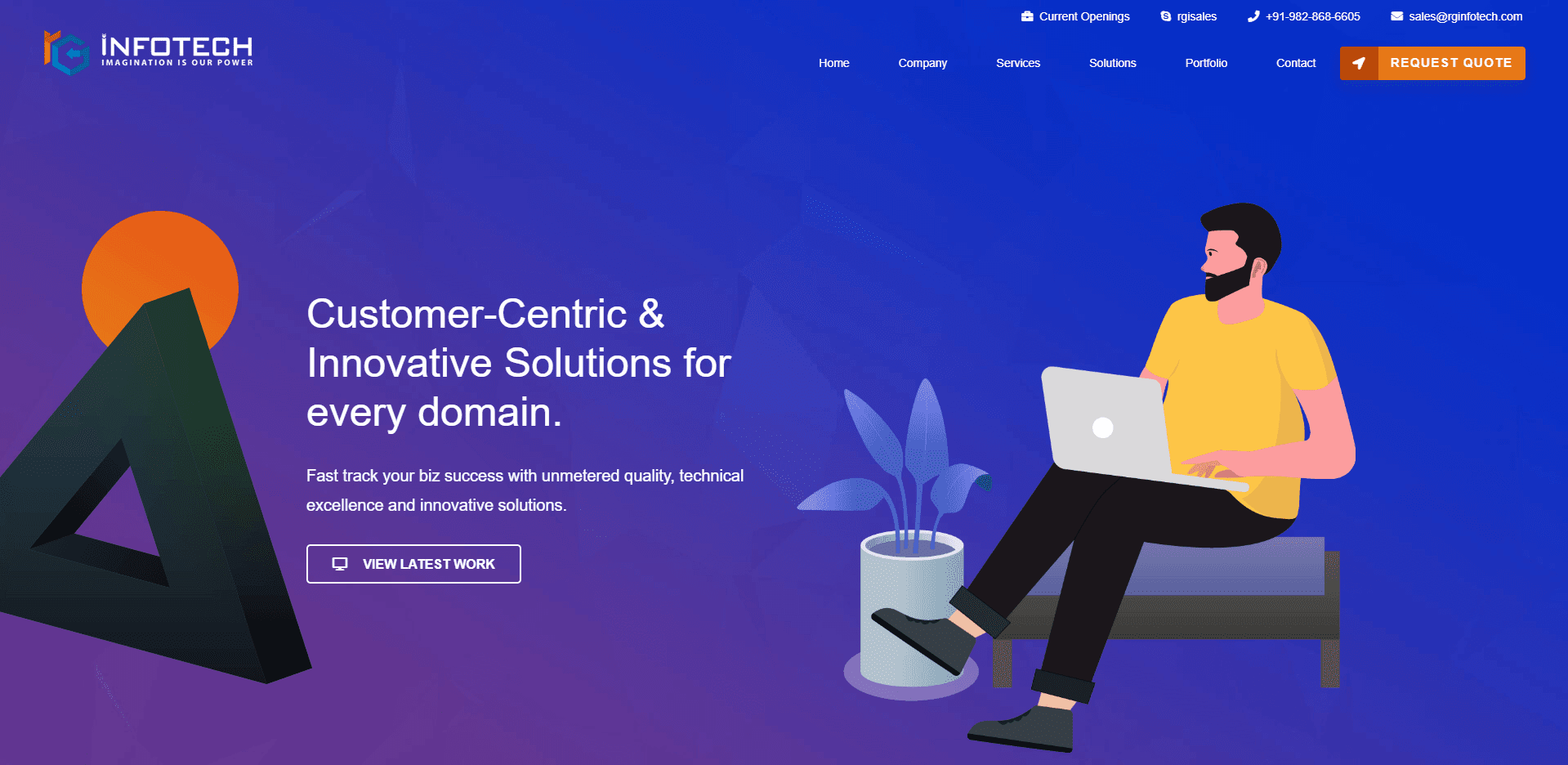How to Choose A Healthcare App Development Company in 2025
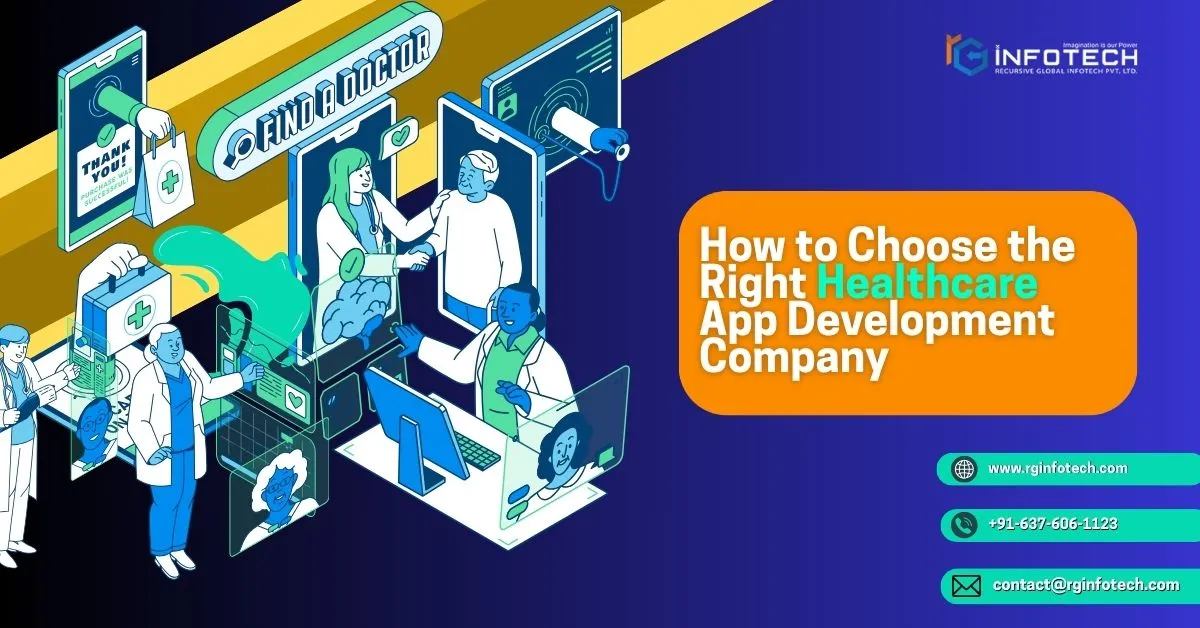
Summary:
Selecting the right mobile health app development company for your healthcare booking system is the key to success. This handbook assists you in identifying how to choose the right healthcare app development company by considering important factors such as industry expertise, HIPAA compliant app development company, UX design, and more. Discover how a top mobile app development company can turn your healthcare dream into reality.
In today’s rapidly changing digital health landscape, individuals expect nothing but ease, security, and efficiency while scheduling a doctor’s appointment. Yet, behind every seamless “click-to-book” process stands a group of passionate developers.
So, how do you select a custom healthcare software development company that will help you bring your vision to life as a solid, exceptional healthcare booking system?
If you’re looking into this, then follow this guide through each decision point, from creating your healthcare system to finally launching your app at the forefront.
Healthcare App Development Market Overview
A health booking system enables patients to book, rebook, or cancel appointments with healthcare providers through mobile applications or websites. The best systems also feature:
- Telemedicine integration
- Patient reminders through SMS or email
- Doctor availability in real-time
- Integration with EHR/EMR systems
Based on a study by Grand View Research, the healthcare mhealth market globally was estimated at approximately USD 114.17 billion in 2024.
The market is expected to grow significantly, reaching a value of about USD 1,070.58 billion by the year 2030, with a compound annual growth rate (CAGR) of 45.2% between 2025 and 2030.
Growth is primarily fueled by a high smartphone penetration and also by a rising demand for easy, digital healthcare services.

Key Market Highlights:
-
-
-
- North America led the world market in 2024, accounting for 36.5% of overall revenue.
- The United States was the top-selling market within the region, leading to massive growth and development.
- Out of all the different app categories, fitness and training apps took the largest market share, accounting for 34.3% of the category.
- Android was the best-selling platform, with the highest revenue across all devices.
- From a technology perspective, non-AI-powered apps generated the highest proportion of market revenue in 2024.
- Aside from convenience, these systems also alleviate administrative hassles, reduce no-shows, and enhance patient satisfaction.
-
-
With the healthcare industry becoming increasingly digital, the need for experienced developers of doctor appointment apps has never been higher.
Ready to Build Your Custom Healthcare App?
Collaborate with RG Infotech to turn your healthcare vision into a powerful, secure, and user-friendly digital solution.
Why You Require The Best Healthcare App Development Company
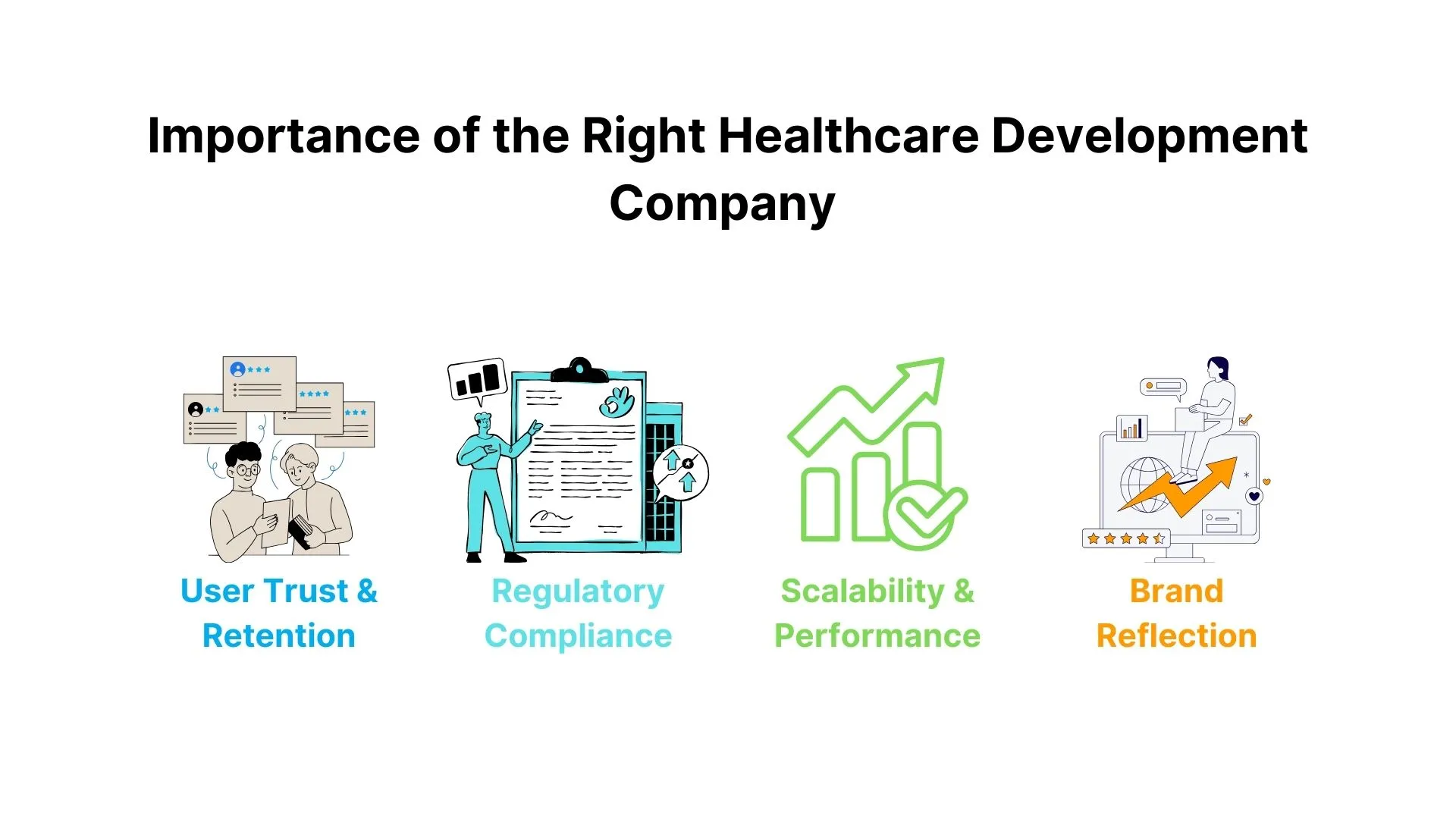
Selecting the wrong development team can lead to wasted time, blown budgets, and, worst of all, non-compliance with data security regulations.
That’s why selecting the right healthcare app development company isn’t simply a technical one. It’s a strategic one. You must choose your developer wisely for the development.
If you require more questions to be answered, read the blog on how to develop a healthcare app to discover in-depth about this.
Some of the points to keep in mind while choosing the right development company:
User Trust & Retention: Healthcare is personal data. If there is a tiny bug or perceived security issue, users will jump to another app in an instant.
Regulatory Compliance: HIPAA in America, GDPR in Europe, local health data regulations elsewhere. A developer who doesn’t understand this can expose you to legal liability.
Scalability & Performance: A clinic can expand to a hospital network. Check that the system accommodates sudden bursts of appointments, doctors, or geography.
Brand Reflection: Your app is usually the first interaction patients have with your service. A sticky interface is a negative first impression.
So, choosing the right partner isn’t only about price or velocity; it’s about building a product that represents your values, honors regulations, and gains user loyalty.
How to Choose A Healthcare App Development Company
Selecting the correct healthcare app developers for startups is a difficult task as it involves many challenges. So, we have resolved your problem and came up with the pointers to help you find the best with things you should add and avoid to bring your project to success.
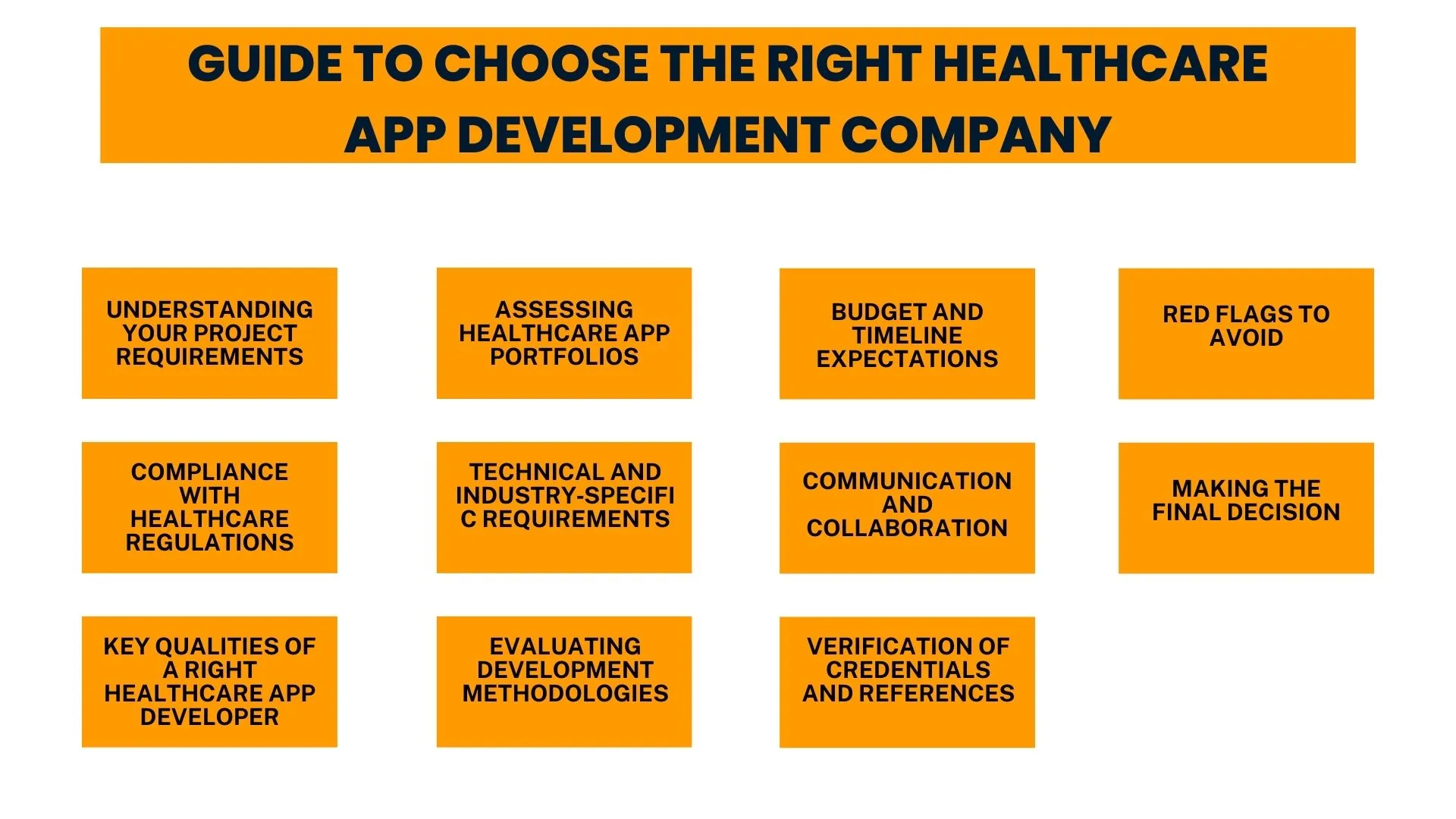
Understanding Your Project Requirements
Set your needs straight before you start looking for developers. Developers can only do their best if your vision is clear.
Defining the Scope of Your Healthcare Booking System
Before diving in, choosing the developer for your project, define the project scope, what you require to answer the specific question for yourself, as mentioned below:
Begin by specifying:
- Who is your target market? (Hospitals, clinics, patients?)
- Will you need to handle multiple locations or languages?
- Is integration with telemedicine necessary?
- Do you require admin dashboards and reporting functionality?
The more defined your scope is, the more accurately your developers will be able to price and plan the project.
What Are You Building Exactly?
The biggest mistake people make is not having complete clarity of what they want to build before they go looking for doctor appointment app developers. The more you know what you want, the better your match. Here are things to clarify:
Aspect
Why It’s Important
Target users (patients, doctors, admin staff)
Various users require various UI/UX flows. Something suitable for a patient will anger a clinician.
Core features (booking, reminders, telemedicine, billing)
Each added feature adds complexity. Understanding your must-haves assists in locating developers with the right experience.
Integration needs (EHRs/EMRs, payment gateways, calendar tools)
Not all developers are skilled at system integrations. You’ll want someone with proven experience.
Regulatory constraints
If you are in a regulated environment, you will require devs with expertise in accounting, data security, and medical device legislation.
Scalability & performance expectations
Will the user base be hundreds or millions? Will there be load spikes (e.g, flu season illness)?
Key Features and Functionalities Required
Below is a checklist of the basic features that are common in most healthcare appointment booking apps:
- Secure user registration and login
- Doctor profile management
- Appointment scheduling and calendar sync
- Video consultations
- Real-time notifications
- In-app chat
- Payment processing
An excellent doctor appointment app development company will integrate all the essential features into your app, but also advise you on the ideal method for doing so, depending on your users.
Compliance with Healthcare Regulations (HIPAA, GDPR)
This is not negotiable. Your app has to comply with data protection laws depending on your location:
- HIPAA (U.S.): Demands safe storage and transmission of Protected Health Information (PHI).
- GDPR (Europe): Entitles users to have control of personal data.
- PIPEDA (Canada), HL7, and others may be applicable, too.
The top healthcare app development company will know these from day one.
Check Key Qualities Required In a Best Healthcare App Developers for Startups
You have a good idea of what the system must accomplish. Now, let’s identify who must accomplish it.
Technical Skills in the Applicable Technologies
A skilled doctor appointment app developer should be familiar with:
-
-
-
- Native mobile development (Swift / Kotlin) or cross-platform frameworks such as React Native, Flutter, if that’s your preference.
- Backend technologies with scaling capabilities (Node.js, Python, Java, etc.).
- Database systems suitable for performance and security (SQL, NoSQL, with encryption at rest).
- Cloud infrastructure (AWS, Azure, Google Cloud), particularly if you anticipate sporadic traffic or rapid growth.
- Additionally crucial: understanding of APIs, video-streaming protocols (if you’ll provide telemedicine), payment gateways, geolocation, etc.
-
-
Experience in Healthcare App Development
You want someone who has done it before. A developer with experience in the healthcare domain will help you know the legalities of building a healthcare app, such as knowledge about:
- Regulatory compliance
- Clinical workflows
- Terminology and domain‑specific needs
Request to view case studies of prior healthcare apps (particularly booking/appointment ones). Check how they addressed sensitive data, scheduling conflicts, cancellation policies, and integration with medical records.
Knowledge of User Experience (UX) and User Interface (UI) Design
Healthcare apps are used by a wide variety of people, like young, old, tech-friendly, and not-so-tech-friendly. The UX needs to be intuitive, easy to use, and comforting. The UI needs to be clean, readable, color palette calming, with strong feedback (e.g., “Your appointment is booked,” etc.).
Good doctor appointment app developers will prototype early, do usability testing (even informal), create error-handling flows, and focus on minimizing friction (less clicking, explicit instructions).
Understanding Data Security and Privacy Guidelines
This fits into both regulation and customer trust. Ensure your developer is aware of:
- Data encryption (in transit and at rest).
- Safe authentication (2FA, OAuth, etc.).
- Good session management.
- Safe storage of media content (e.g., recordings, images if used).
- Auditing and logging.
- Disaster recovery and backups.
Ask them what controls they implemented in previous projects and their best practices.
Assessing Healthcare App Development Company Portfolios
Now that you understand what you need, how do you determine if a company or developer is right for your project, or whether they can fulfill your requirements or not?
Looking at Previous Healthcare Projects
A portfolio is a glimpse into what they can achieve. When checking:
Do they display apps like yours? Particularly with booking platforms, telemedicine, or patient-physician communication.
Do they demonstrate metrics, screenshots, or anecdotes: how many users were reached, what problems were overcome, what features they implemented, what regulatory hurdles?
Are they able to give you live apps to download and try out, or demos? Check all the things to select the best company for your project.
Evaluating App Performance and User Feedback
An app may be aesthetically pleasing, but performance is key:
- Is it responding quickly? Does it slow down when loaded? How are the load speeds?
- What do users complain about in app stores or reviews: crashing, bugs, or usability?
Reviews will give you a chance to identify red flags like repeated complaints, crashing, poor UX, and omitted features.
Verifying Scalability and Integration Capability
Your medical appointment booking system may begin small, but it should ideally scale:
The programmer can create architectures that facilitate scaling (e.g., microservices, modular architecture)
Must have experience integrating with outside systems like EHR/EMR systems, payment processors, and third-party telemedicine systems?
And know everything about API versioning, backward compatibility?
Case Study: Erahealth – Healthcare Platform
Checking Technical and Industry‑Specific Requirements
In addition to portfolio and credentials, there are specific technical and industry requirements you can’t disregard.
Platform Compatibility (iOS, Android, Web)
Perhaps a web portal too for administration? Choose a developer who’s experienced in the required platforms.
If cross‑platform, make sure the trade‑offs (performance, UX fidelity, cost) are clearly understood.
Integration with Current Healthcare Systems (EHR, EMR)
If your clinics or referral hospitals are already utilizing EHR or EMR, your app must integrate seamlessly. That is:
-
-
-
- Understanding standard data formats (HL7, FHIR).
- Secure APIs.
- Data synchronization (real‑time vs batch).
- Inquire if the developer has completed such integrations on previous projects.
-
-
Use of Secure APIs and Cloud Solutions
Cloud infrastructure provides agility and scalability. But with it comes responsibility:
- The use of HIPAA-compliant cloud services or equivalent in your jurisdiction.
- The utilization of secure APIs (authentication, authorization, encryption).
- Monitoring, logging, intrusion detection.
Support for Telemedicine and Scheduling Appointments Features
If telehealth is in your system:
-
-
-
- Make sure the telemedicine app development company is familiar with video APIs (WebRTC or proprietary).
- Bandwidth limitations and connectivity problems from the user’s perspective.
- Scheduling appointments with buffer time, cancellations, and doctor availability in various time zones.
-
-
These aren’t minor add‑ons; they can have a big impact on how your system behaves and how users perceive it.
Read Related Blog: How to Develop a Telemedicine App
Evaluating Development Methodologies
It is important to think about the development methodologies in terms of who does rather than just thinking about how the work is done.
Agile versus Waterfall Approaches to Development
Waterfall Approach: specify everything first, then build, then test. It will work if your requirements are clear and fixed. But healthcare projects tend to require flexibility.
Agile (or hybrid) provides space for iteration: initial prototypes, feedback loops, incremental releases. You can refine according to what you find out during development or through user testing.
The majority of the top healthcare app development companies use Agile, particularly for systems such as booking apps.
Importance of Prototyping and Iterative Testing
Prototypes enable you to experiment early before investing in significant resources. You’ll catch design flaws, usability bugs, and misunderstandings earlier.
Iterative testing implies usability tests, functional tests, and security tests at various points, not only at the end. Select a doctor appointment application development company that incorporates quality checks, code reviews, and test plans.
Post‑Launch Support and Maintenance Plans
You do not finish the project once you go live. There will be bugs, user comments, potentially regulatory changes, or new feature requirements. Ask:
- What bug‑fix / support windows are they providing?
- What SLA (Service Level Agreement) are they guaranteeing?
- Do they provide monitoring of app performance, security, crashes, and user comments following release?
Budget and Timeline Expectations
Money and time are not separable from any project. However, realistic expectations are how you avoid sacrificing quality or producing a half-baked app.
Estimating Cost to Hire Healthcare App Development Company
Cost is dependent on:
- Scope & features: basic appointment booking is lower; telemedicine, payment, integrations, and analytics increase cost.
- Platforms: web + mobile = more.
- Depth of UI/UX design.
- Compliance and security features.
Ensure quotes cover all these. You sometimes receive a low quote but realize subsequently you’ll have to pay extra for encryption, compliance audits, etc.
Balancing Quality with Budget Limitations
Cheapest is not always best. Skimping on security, UX, or backend scalability will ultimately cost more in repairs, reputation, or legal expenses down the line.
Establish must‑haves versus nice‑to‑haves. Maybe you ship with a Minimum Viable Product (MVP) with core features and add more sophisticated ones in the future. That way, you get to market faster with less risk.
Establishing Realistic Schedules for Development and Deployment
Regulatory approvals, test cycles, etc., don’t happen in “two weeks” for a solid, compliant app.
Collaborate with your developer to chart out stages: discovery, design, development, testing, deployment, and post‑launch. Add buffer time for unexpected issues.
Communication and Collaboration
Even the most proficient doctor appointment app developers won’t be able to deliver if communication breaks down.
Why Clear and Frequent Communication Matters
You need to set up:
- Points of contact (project leader, designers, programmers).
- Regular status reports (weekly, bi‑weekly).
- Communication channels: email, Slack/Teams, video calls.
This prevents issues from arising later, aligns everyone, and fosters trust.
Assessing Developer Responsiveness
When you initially reach out to developers, pay attention:
- Do they reply quickly and concisely?
- Do they pose questions to clarify?
- Do they offer ideas or simply appear to be “ticking boxes”?
These initial interactions tend to reflect how dependable they’ll be in the long run.
Collaborative Practices and Project Management Tools
What software do they employ for issue tracking, bugs, and tasks? (e.g. Jira, Trello, Asana). How do they manage version control (Git, etc.)?
Transparency in the process lets you observe where you are, identify bottlenecks, and prevent surprises.
Transparency in the process lets you observe where you are, identify bottlenecks, and prevent surprises.
Verification of Credentials and References
You want to ensure promises are supported by evidence.
Verification of Developer Certifications and Industry Affiliations
- Security/data protection certifications (ISO 27001, SOC 2, etc.).
- Professional healthcare or tech association affiliations.
- Whether in some regions, they are certified to handle healthcare data.
Reaching Out to Previous Clients for Feedback
Request references and talk to former clients. Some helpful questions:
- Were deadlines/met?
- How was communication?
- How did the developer manage surprises or issues?
- How dependable is their support and maintenance?
- How satisfied are users with the end product?
Red Flags to Avoid in Selecting the Right Developer
It is equally essential to know what to look out for.
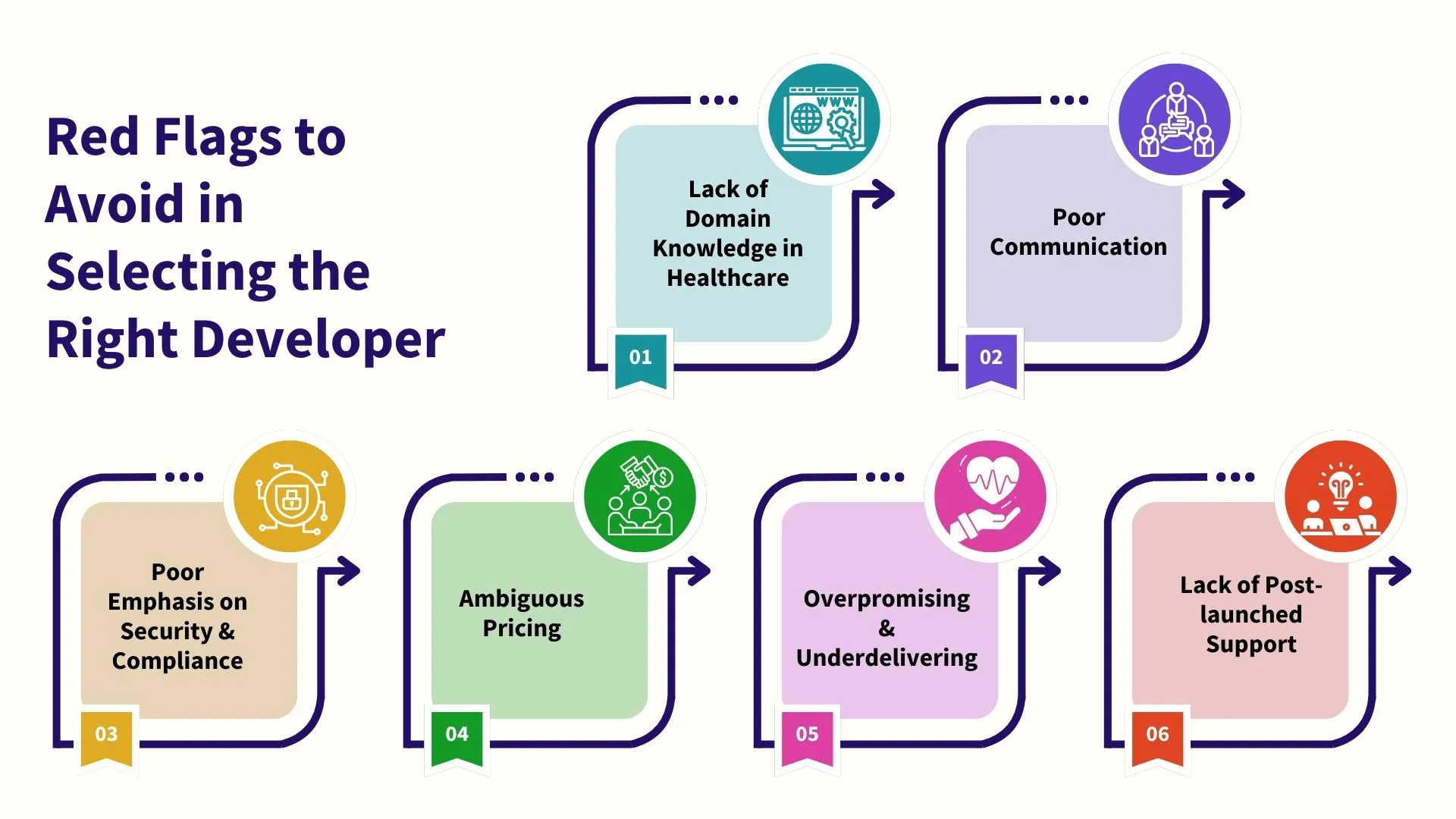
Lack of Domain Knowledge in Healthcare: If individuals have no prior healthcare experience or fail to inquire about regulations, that is a problem.
Poor Communication or Ambiguous Pricing: If quotes are unclear, or they fail to address specific questions, or responses always take a long time.
Poor Emphasis on Security and Compliance: If they skim over encryption, audits, and legal responsibility. Also, if they don’t have plans for data backups, disaster recovery, or monitoring.
Overpromising & Underdelivering: Avoid very aggressive timelines or “all features included” deals at too low a price.
Lack of Post-launched Support: If they wish to launch and then vanish, or have no maintenance plans.
Have an Idea for a Healthcare App?
Let our experts guide you from concept to launch with the latest technology and compliance-first development.
Making the Final Decision For Choosing The Best Healthcare App Development Company
Taking the final decision entails assessing expertise, knowledge about compliance, previous projects, and communication. Opt for the top healthcare app development company that suits your vision, budget, and long-term objectives.
Aligning Developer Capabilities with Your Goals
Your app might prioritize speed to market, ultra‑high security, scalability, or usability. Determine what your non‑negotiables are (e.g., HIPAA compliance, reliable video calls) vs nice to have.
When you talk with developers, ask them how they would prioritize and potentially trade off when there are constraints. Good ones will recommend phased delivery (MVP initially, etc.).
Completing Contracts and Agreements
After you select:
- Create a comprehensive contract that encompasses all deliverables, timelines, cost structure, and quality indicators.
- Add legal safeguards (liability, IP, confidentiality).
- Negotiate maintenance, bug squashing, and future updates.
- Add provisions regarding data ownership, retention of user data, and breach notice.
- Having clarity at this stage avoids future misunderstandings.
As an established top healthcare app development agency, we provide customized solutions that harmonize innovation, security, and compliance.
They are well-known for designing user-friendly, HIPAA and GDPR-compliant apps that fulfill the specific requirements of clinics, hospitals, and health tech startups.
With a proven history, open processes, and dedication to quality, we enable healthcare professionals to provide unified digital experiences and enhance patient engagement by leveraging advanced mobile and web platforms.
Contact us to develop your healthcare booking system.
Conclusion
It takes many difficulties to cover a complicated project to bring to life, but with the right partner, one that weighs technical expertise, regulatory expertise, UX mastery, and clear communication, you can create something that really makes a difference in people’s lives.
When selecting among doctor appointment app developers, don’t just consider price; look for experience in healthcare, security, scalability, and after‑launch support.
If you’re ready to move forward, the next steps are:
- Detailed document your project requirements.
- Get proposals from top healthcare app development firms.
- Weigh portfolios, verify references.
- Negotiate contracts with defined scope, schedules, and legal safeguards.
And with the right team, your healthcare booking system won’t only work, it will impress, gain users’ trust, and deliver care that’s accessible, efficient, and safe.
Frequently Asked Questions (FAQs)
When selecting a healthcare app development firm, consider the following first:
Healthcare Industry Expertise: Make sure the firm has developed telemedicine apps, EHR-integrated platforms, or doctor appointment apps previously. Industry expertise minimizes compliance threats and accelerates development.
Technical Competence: The members of the team must be experienced in cross-platform mobile application development, backend architecture, cloud platforms, and third-party integrations such as payment gateways, calendars, or video conferencing APIs.
Knowledge of Compliance: They should know about HIPAA, GDPR, and other compliance regulations. Query them on how they perform encrypted data storage, user consent, and secure access.
Portfolio & Reviews: Evaluate case studies, live applications, and third-party reviews (such as Clutch or GoodFirms). Get in touch with former customers to find out about their collaborative arrangement and the quality of results.
Communication & Transparency: Opt for a firm with transparent project roadmaps, milestone tracking (through tools like Jira or Trello), and open communication lines (Slack, email, etc.).
Healthcare Industry Expertise: Make sure the firm has developed telemedicine apps, EHR-integrated platforms, or doctor appointment apps previously. Industry expertise minimizes compliance threats and accelerates development.
Technical Competence: The members of the team must be experienced in cross-platform mobile application development, backend architecture, cloud platforms, and third-party integrations such as payment gateways, calendars, or video conferencing APIs.
Knowledge of Compliance: They should know about HIPAA, GDPR, and other compliance regulations. Query them on how they perform encrypted data storage, user consent, and secure access.
Portfolio & Reviews: Evaluate case studies, live applications, and third-party reviews (such as Clutch or GoodFirms). Get in touch with former customers to find out about their collaborative arrangement and the quality of results.
Communication & Transparency: Opt for a firm with transparent project roadmaps, milestone tracking (through tools like Jira or Trello), and open communication lines (Slack, email, etc.).
Regulatory compliance is essential in the development of healthcare apps. This is how to achieve it:
Recruit Developers with Regulatory Know-How: Request concrete instances where the developer has included HIPAA or GDPR elements in previous apps.
Know Your Region’s Laws: HIPAA covers the U.S., while GDPR covers the EU. If your app will be used abroad, you might have to adopt several standards.
Key Compliance Features to Add:
Your development company must walk you through a compliance checklist during the development and discovery stages.
Recruit Developers with Regulatory Know-How: Request concrete instances where the developer has included HIPAA or GDPR elements in previous apps.
Know Your Region’s Laws: HIPAA covers the U.S., while GDPR covers the EU. If your app will be used abroad, you might have to adopt several standards.
Key Compliance Features to Add:
-
-
-
- End-to-end encryption of in-transit and at-rest data
- Role-based access controls and secure authentication mechanisms
- Data collection and sharing consent management features
- Periodic security audits and vulnerability testing
- Logging and audit trails for data access and data changes
-
-
Your development company must walk you through a compliance checklist during the development and discovery stages.
The development cost of a healthcare or doctor appointment app varies based on several factors:
App Complexity: A simple app with scheduling, doctor profiles, and notifications can begin at $30,000–$50,000. Complex apps with telemedicine capabilities, EHR integrations, and compliance features can range from $100,000–$250,000+.
Platform Choice: Developing for iOS and Android individually is costlier than developing with cross-platform frameworks such as Flutter or React Native.
Design Requirements: Custom UI/UX design and accessibility elements will add expense but enhance usability and patient satisfaction.
Backend Infrastructure: Data storage security, user management systems, and third-party API or hospital system integration account for a high cost.
Maintenance & Support: Support after launch, updates, and bug fixes tends to be 15–20% of the initial development budget per year.
Always request your development partner to break down costs, timelines, and optional features in a detailed manner.
App Complexity: A simple app with scheduling, doctor profiles, and notifications can begin at $30,000–$50,000. Complex apps with telemedicine capabilities, EHR integrations, and compliance features can range from $100,000–$250,000+.
Platform Choice: Developing for iOS and Android individually is costlier than developing with cross-platform frameworks such as Flutter or React Native.
Design Requirements: Custom UI/UX design and accessibility elements will add expense but enhance usability and patient satisfaction.
Backend Infrastructure: Data storage security, user management systems, and third-party API or hospital system integration account for a high cost.
Maintenance & Support: Support after launch, updates, and bug fixes tends to be 15–20% of the initial development budget per year.
Always request your development partner to break down costs, timelines, and optional features in a detailed manner.
Core features will depend on the kind of healthcare app, but for a doctor appointment app, the following are critical:
User Registration & Profile Management: Doctors and patients should be allowed to create and manage profiles safely.
Doctor Listings & Search Functionality: Users can browse doctors by location, specialty, availability, and reviews.
Appointment Scheduling: Real-time scheduling functionality, calendar integrations, and automated reminders are requirements.
Telehealth Integration: In-app video calls, voice chats, or even AI-powered chatbots can make a big difference in remote consultations.
Digital Prescriptions: Enable physicians to create and transmit prescriptions electronically within the app.
Payment Gateway Integration: Facilitate online payment with secure processing for consultations or services.
Notifications & Alerts: Reminder notifications, follow-up messages, and updates reduce no-shows and ensure care continuity.
Data Privacy & Security: Apply biometric logins, data encryption, and access control for protecting patient information.
These features not only add functionality but also provide a seamless and trustworthy user experience.
User Registration & Profile Management: Doctors and patients should be allowed to create and manage profiles safely.
Doctor Listings & Search Functionality: Users can browse doctors by location, specialty, availability, and reviews.
Appointment Scheduling: Real-time scheduling functionality, calendar integrations, and automated reminders are requirements.
Telehealth Integration: In-app video calls, voice chats, or even AI-powered chatbots can make a big difference in remote consultations.
Digital Prescriptions: Enable physicians to create and transmit prescriptions electronically within the app.
Payment Gateway Integration: Facilitate online payment with secure processing for consultations or services.
Notifications & Alerts: Reminder notifications, follow-up messages, and updates reduce no-shows and ensure care continuity.
Data Privacy & Security: Apply biometric logins, data encryption, and access control for protecting patient information.
These features not only add functionality but also provide a seamless and trustworthy user experience.
Here are some critical pitfalls to avoid when hiring a healthcare app development firm:
Forgoing Industry Experience: A generic developer can create an excellent app, but won’t adhere to healthcare-specific requirements such as HIPAA or GDPR, endangering you with possible legal repercussions.
Skipping Compliance: Without compliance baked into the app from the beginning, it may mean expensive rework or even legal sanctions down the line.
Putting Cost Ahead of Quality: Choosing the lowest-cost option usually leads to substandard code quality, late timelines, and insufficient post-launch maintenance.
Make sure to avoid all the negative pointers and choose wisely your healthcare app developer.
Forgoing Industry Experience: A generic developer can create an excellent app, but won’t adhere to healthcare-specific requirements such as HIPAA or GDPR, endangering you with possible legal repercussions.
Skipping Compliance: Without compliance baked into the app from the beginning, it may mean expensive rework or even legal sanctions down the line.
Putting Cost Ahead of Quality: Choosing the lowest-cost option usually leads to substandard code quality, late timelines, and insufficient post-launch maintenance.
Make sure to avoid all the negative pointers and choose wisely your healthcare app developer.
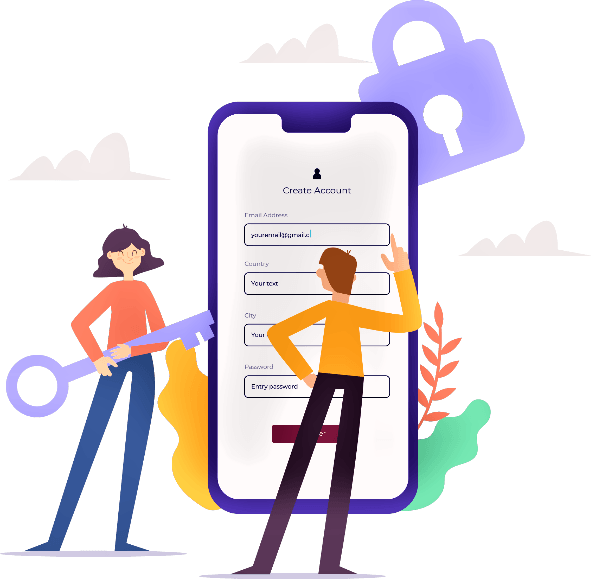


 rgisales
rgisales



